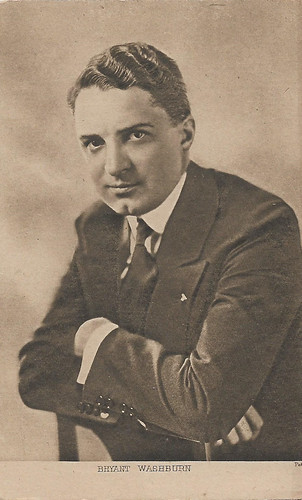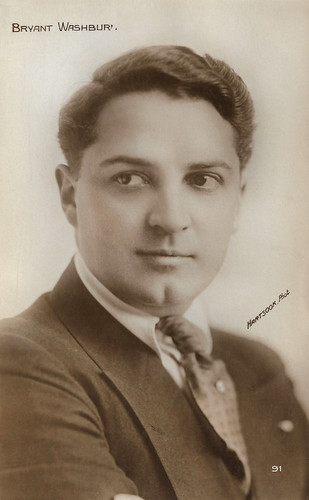Bryant Washburn (1889–1963) was an American film actor, who appeared in 375 films between 1911 and 1947. From 1911, he was one of the leading actors of the Essanay company and later of Paramount. In the 1910s and the early 1920s, he was one of the most popular American actors.

British postcard. Photo: Essanay Film Mfg. Co.
Bryant Washburn was born in 1889 in Chicago, Illinois, USA as Franklin Bryant Washburn III Washburn's parents were Franklin Bryant Washburn II and Metha Catherine Johnson Washburn. Bryant attended Lake View High School in Chicago
Washburn's early acting experience came in stock theatre. From 1911 on, he appeared in short films and features for the Essanay Film Manufacturing Company of Chicago. One of his first films was the silent comedy The Dark Romance of a Tobacco Tin (1911) with Francis X. Bushman. Apparently, the film was about blackface and interracial marriage.
The following years, he became one of Essanay's leading actors in such films as The Power of Conscience (Theodore Wharton, 1913) opposite Francis X. Bushman, and the comedy The Slim Princess (E. H. Calvert, 1915) starring Francis X. Bushman, Ruth Stonehouse and Wallace Beery. Alternately, he played heroes and villains.
Washburn quickly became a comedy star after appearing in films such as Skinner's Baby (Harry Beaumont, 1917), Skinner's Bubble (Harry Beaumont, 1917) and Skinner's Dress Suit (Harry Beaumont, 1917) with Hazel Daly and Virginia Valli. The third in the series, Skinner's Baby, was quite a success. It was Jackie Coogan's first film role, as the baby, though uncredited. The film is believed to be lost.
In 1918 Washburn moved over to Paramount/Famous Players-Lasky and graduated to bigger roles, either as romantic leads in second features or as supporting actor in A-grade productions. He played the lead in the silent drama Till I Come Back to You (Cecil B. DeMille, 1918) with Florence Vidor, and the comedy The Way of a Man with a Maid (Donald Crisp, 1918) with Wanda Hawley.
In 1917-1918 Washburn also played in a handful of films released by Pathé Exchange, such as the coming-of-age comedy Twenty-One (William Worthington, 1918) and the comic Western Ghost of the Rancho (William Worthington, 1918), and produced by small companies such as the Anderson-Brunton Company.

French postcard by Editions Paramount, Paris. Photo: Northland.

British postcard. Photo: Pathé Frères Cinema Ltd.
From the mid-1920s, Bryant Washburn played supporting parts in such films as the adventure film Rupert of Hentzau (Victor Heerman, 1923) starring Bert Lytell, Elaine Hammerstein and Lew Cody, and the silent fantasy-adventure comedy The Wizard of Oz (Larry Semon, 1925) with Dorothy Dwan as Dorothy, and Oliver Hardy as the Tin Woodman. Washburn managed to continue so well into the sound era.
By the time sound pictures arrived, Washburn had lost his looks and was relegated to minor or bit parts. In the drama What Price Hollywood? (George Cukor, 1932), he played a washed-up Hollywood star. An uncredited role. He also could be seen in The Call of the Savage (Lew Landers, 1935), a Universal serial based on the story 'Jan of the Jungle' by Otis Adelbert Kline.
One of his last roles was in the Western West of the Pecos (Edward Killy, 1945) starring Robert Mitchum and Barbara Hale. Bryant Wasburn died of a heart condition in 1963 in Hollywood. His interment was located in Culver City, California's Holy Cross Cemetery.
Wasburn was married twice, first to actress Mabel Forrest from 1914 on and later to actress Virginia Vance, from 1929 till her death in 1940 He had two sons with his first wife: Dwight and Bryant. Bryant Washburn, Jr. (1915–1960), was also an actor, a major in the US Air Force Reserve, served during World War II and Korea, and predeceased his father. Washburn also had a daughter, Roberta Catherine (1930), with his second wife, Virginia. His daughter was later known as Sister Mary Luke of St. John's Convent in King City, CA.

French postcard by Editions Cinémagazine, no. 91. Photo: Hartsook.
Sources: Wikipedia and IMDb.

British postcard. Photo: Essanay Film Mfg. Co.
Alternately playing heroes and villains
Bryant Washburn was born in 1889 in Chicago, Illinois, USA as Franklin Bryant Washburn III Washburn's parents were Franklin Bryant Washburn II and Metha Catherine Johnson Washburn. Bryant attended Lake View High School in Chicago
Washburn's early acting experience came in stock theatre. From 1911 on, he appeared in short films and features for the Essanay Film Manufacturing Company of Chicago. One of his first films was the silent comedy The Dark Romance of a Tobacco Tin (1911) with Francis X. Bushman. Apparently, the film was about blackface and interracial marriage.
The following years, he became one of Essanay's leading actors in such films as The Power of Conscience (Theodore Wharton, 1913) opposite Francis X. Bushman, and the comedy The Slim Princess (E. H. Calvert, 1915) starring Francis X. Bushman, Ruth Stonehouse and Wallace Beery. Alternately, he played heroes and villains.
Washburn quickly became a comedy star after appearing in films such as Skinner's Baby (Harry Beaumont, 1917), Skinner's Bubble (Harry Beaumont, 1917) and Skinner's Dress Suit (Harry Beaumont, 1917) with Hazel Daly and Virginia Valli. The third in the series, Skinner's Baby, was quite a success. It was Jackie Coogan's first film role, as the baby, though uncredited. The film is believed to be lost.
In 1918 Washburn moved over to Paramount/Famous Players-Lasky and graduated to bigger roles, either as romantic leads in second features or as supporting actor in A-grade productions. He played the lead in the silent drama Till I Come Back to You (Cecil B. DeMille, 1918) with Florence Vidor, and the comedy The Way of a Man with a Maid (Donald Crisp, 1918) with Wanda Hawley.
In 1917-1918 Washburn also played in a handful of films released by Pathé Exchange, such as the coming-of-age comedy Twenty-One (William Worthington, 1918) and the comic Western Ghost of the Rancho (William Worthington, 1918), and produced by small companies such as the Anderson-Brunton Company.

French postcard by Editions Paramount, Paris. Photo: Northland.

British postcard. Photo: Pathé Frères Cinema Ltd.
Losing his looks
From the mid-1920s, Bryant Washburn played supporting parts in such films as the adventure film Rupert of Hentzau (Victor Heerman, 1923) starring Bert Lytell, Elaine Hammerstein and Lew Cody, and the silent fantasy-adventure comedy The Wizard of Oz (Larry Semon, 1925) with Dorothy Dwan as Dorothy, and Oliver Hardy as the Tin Woodman. Washburn managed to continue so well into the sound era.
By the time sound pictures arrived, Washburn had lost his looks and was relegated to minor or bit parts. In the drama What Price Hollywood? (George Cukor, 1932), he played a washed-up Hollywood star. An uncredited role. He also could be seen in The Call of the Savage (Lew Landers, 1935), a Universal serial based on the story 'Jan of the Jungle' by Otis Adelbert Kline.
One of his last roles was in the Western West of the Pecos (Edward Killy, 1945) starring Robert Mitchum and Barbara Hale. Bryant Wasburn died of a heart condition in 1963 in Hollywood. His interment was located in Culver City, California's Holy Cross Cemetery.
Wasburn was married twice, first to actress Mabel Forrest from 1914 on and later to actress Virginia Vance, from 1929 till her death in 1940 He had two sons with his first wife: Dwight and Bryant. Bryant Washburn, Jr. (1915–1960), was also an actor, a major in the US Air Force Reserve, served during World War II and Korea, and predeceased his father. Washburn also had a daughter, Roberta Catherine (1930), with his second wife, Virginia. His daughter was later known as Sister Mary Luke of St. John's Convent in King City, CA.

French postcard by Editions Cinémagazine, no. 91. Photo: Hartsook.
Sources: Wikipedia and IMDb.
No comments:
Post a Comment